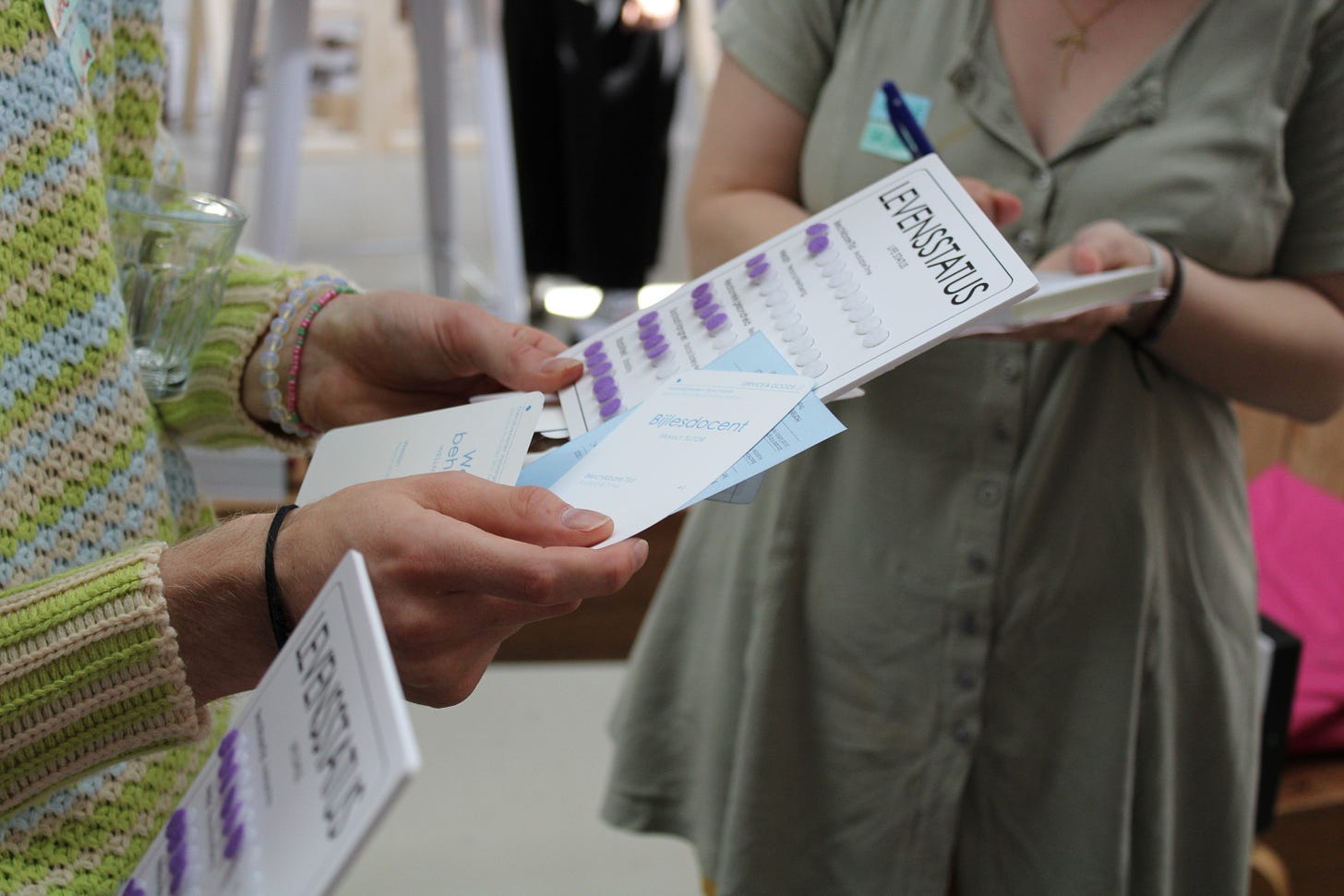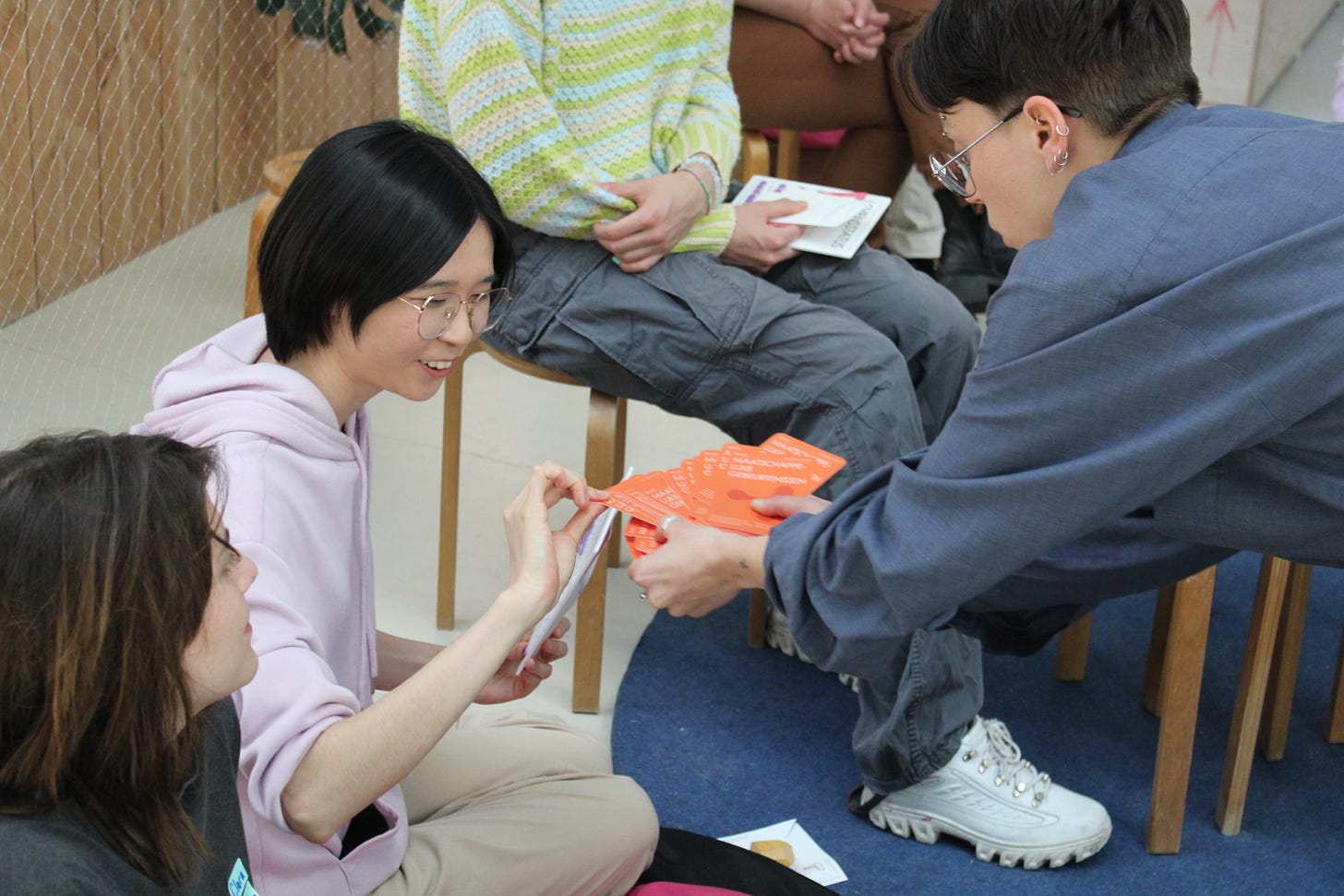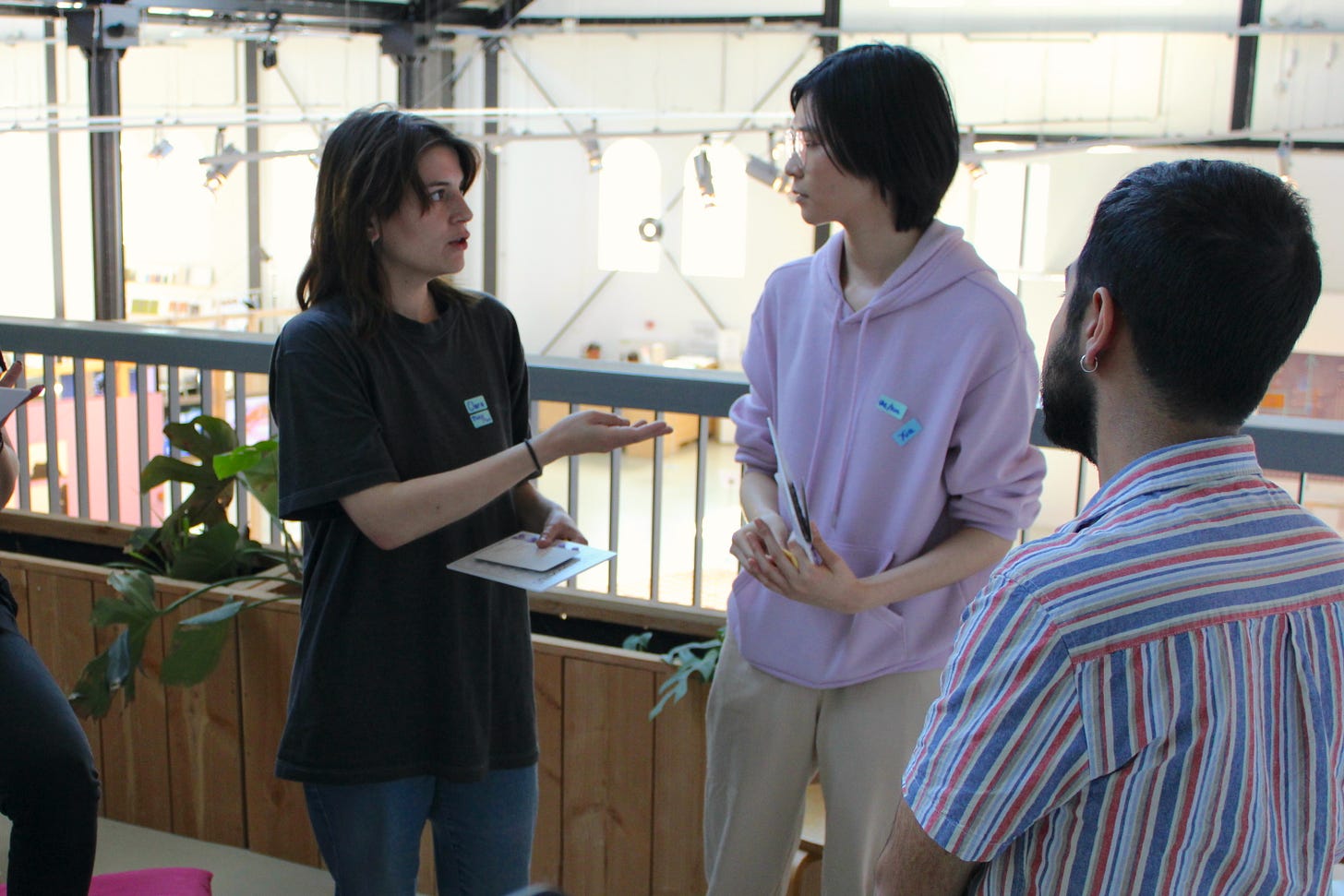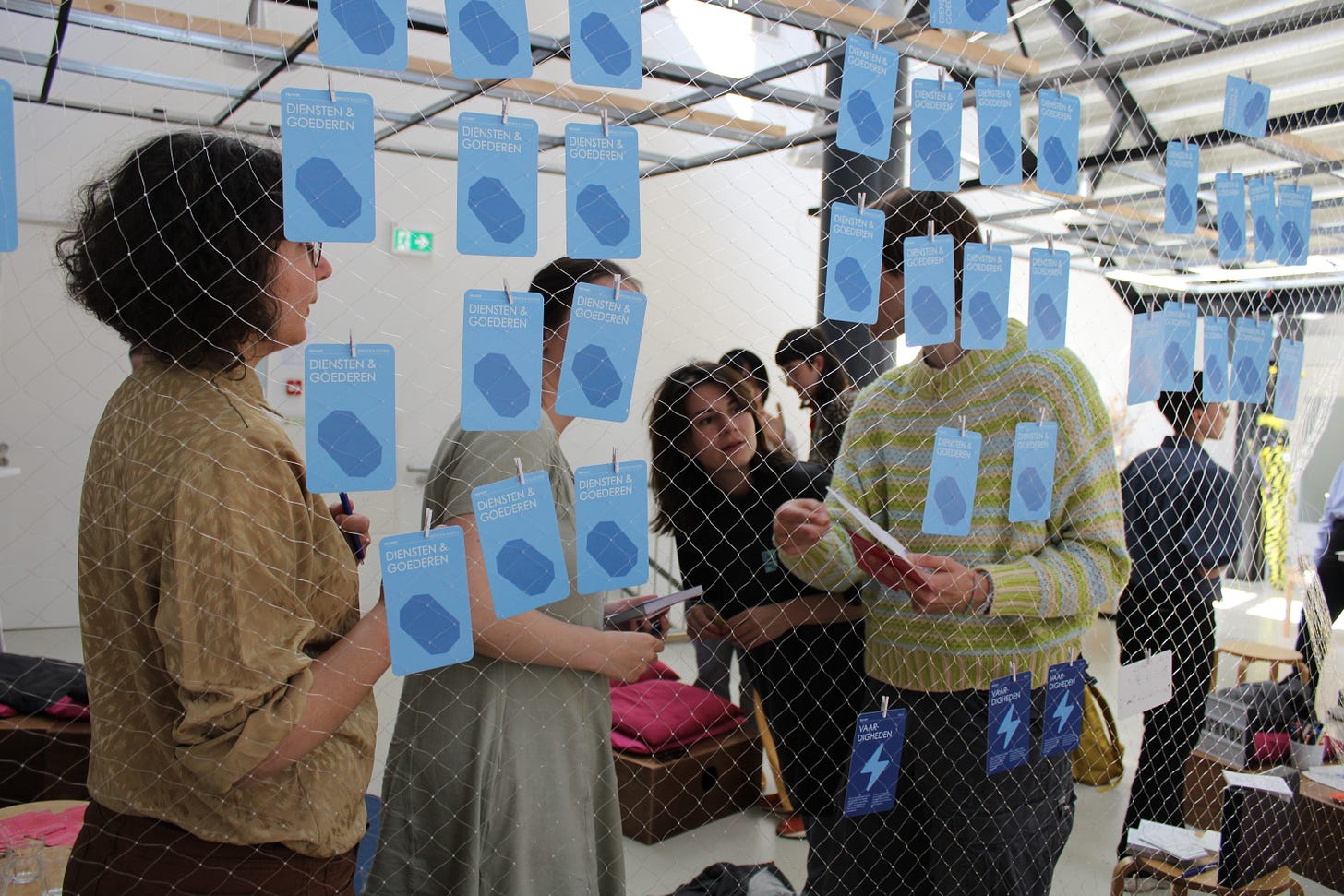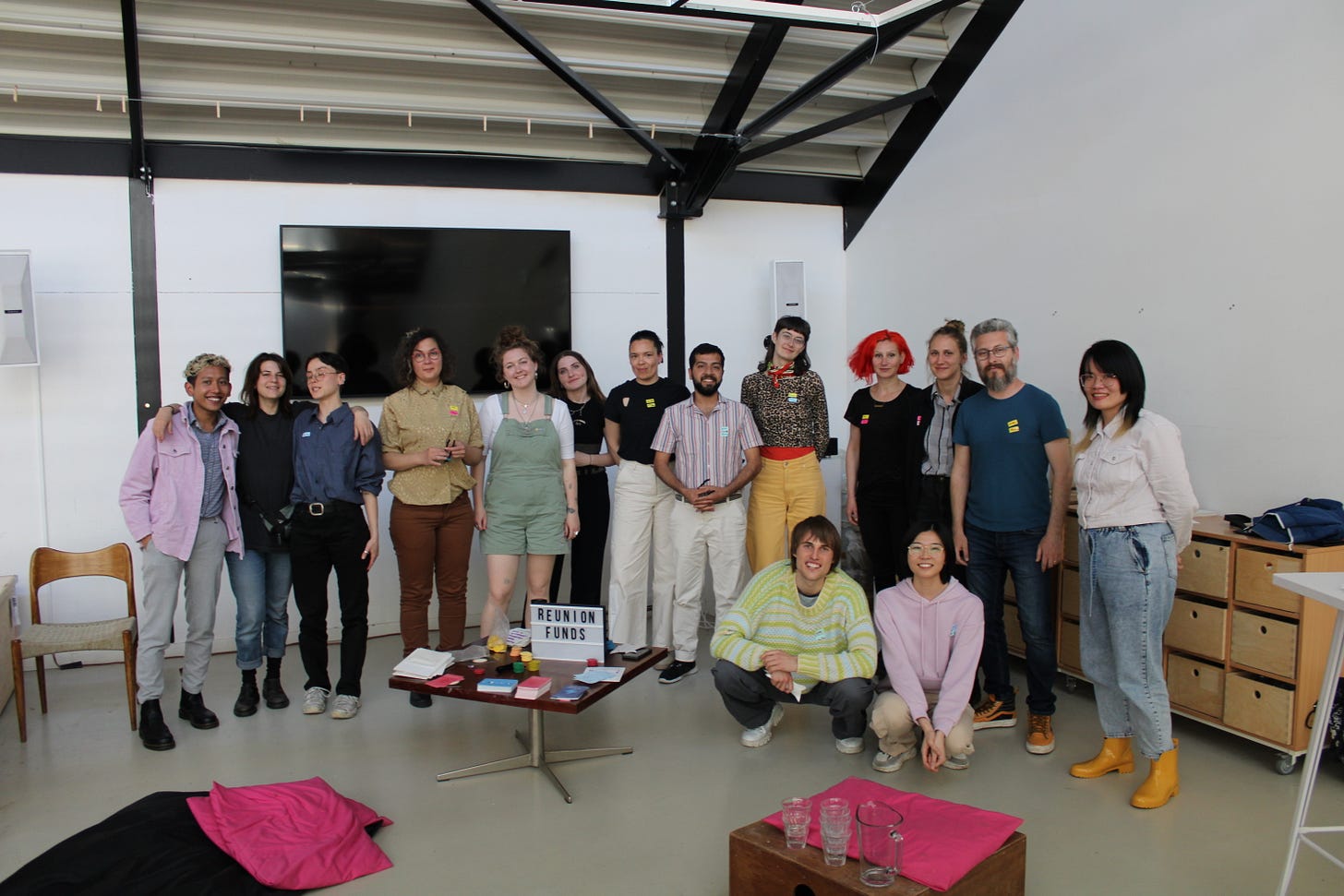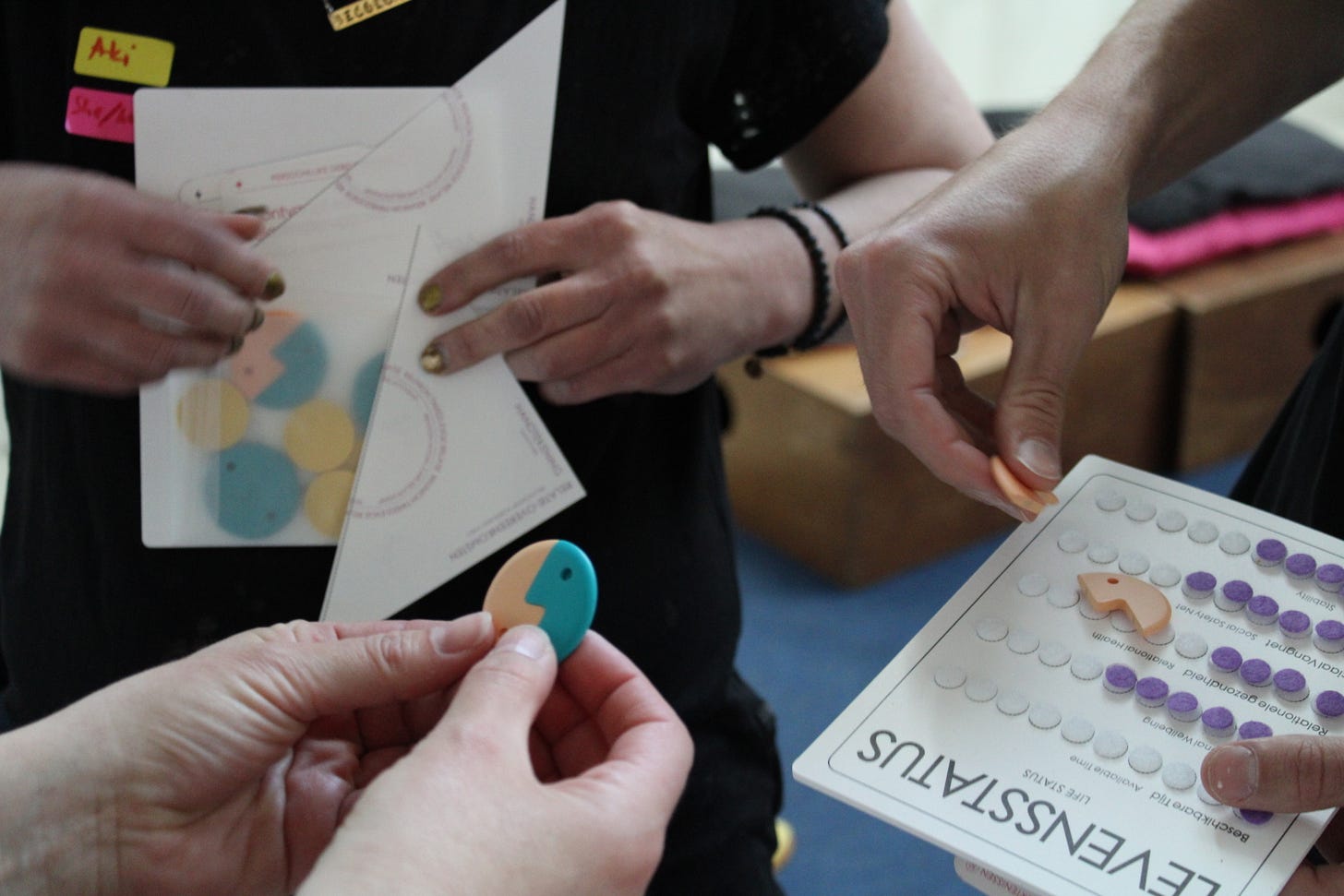On May 8th, 2022, the first Dutch version of Liquid Dependencies took place at Framer Framed Amsterdam as part of the Common In Festival. The residential report summarises what happened and our collective reflections.
Written by Sylvie Vanwijk, @slvi.e
Edited by Yin Aiwen and Anouk Asselineau
Overview of Years 2023-2043
In ‘The city with Intention’ the ReUnion society has had a difficult time establishing stability during the last 20 years. Both literally, through a succession of earthquakes and figuratively as this is a relatively poor, working society, where time and money are scarce. Nonetheless in the public and private sphere the intention of care has been very clearly present.
Hourglass community : Time is the Enemy
The structure of society as well as the labour conditions were a hindrance in facilitating an active caring community. Individually, residents seem to always be on the verge of something happening, rendering the act of taking care of others a luxury - often just a little out of reach.
There has been a disparity between the government’s records of the existing relationships and those that exist in reality. Due to lack of time, relationships sometimes took years to be registered, meaning that the dependency on financial coins was bigger, due to low availability of mutual coins. Though the society was more fragile, it includes a wide range of different, imaginative and fluid relationships, spanning across different generations and natures.
Hospitable housing strategies : The Architecture of Survival
Public services (specifically welfare and infrastructure) have been somewhat underdeveloped as the money raised through taxes does not facilitate large-scale improvements.
During these 20 years, there has been a large-scale resignation of underpaid and overburdened workers. As a working class community, many of the residents were impacted by this event. Almost half of the community lost their jobs. Though this opened up more time, many residents' stability decreased significantly. The government has tried to counteract this by raising the maximum allowed rental price applicable for rental subsidies. This put significant weight on the scales. This governmental intervention seems not only to have been an attempt at easing the pressure on citizens that have just been laid off - but also responds to something more structural that has been happening : privatised architectural development.
Private contractors have been demolishing lower and middle income housing while building higher income housing in their place. There is no place in this society for these types of housing as the majority of its citizens do not nor will they in the future be able to afford them. As a short term solution, to make this type of housing more affordable for its citizens, the government has raised the subsidies. In the long term the government is putting its energies into de-privatising the important contractors. Yet - without much reverberation. The shady business of the private corporations was first-hand experienced by Clara as a construction worker and later publicised through a co-written piece with freelance journalist Xia, which has contributed to the government taking such firm actions.
Shaky foundations: Improvised / Impoverished Infrastructure
Architecture has been one of the struggles of this society, becoming increasingly fragile due to a series of earthquakes, the cause of which until now has remained obscure. There has not been enough money to properly look into this. The government responded by restricting the recreational zones. With time, it became clear that specifically high rise buildings, mostly housing office complexes, were affected by the earthquakes. Making it increasingly dangerous to enter these places. The government responded with the implementation of a 50% home office. Addressing the consequences rather than the causes of the earthquakes.
This governmental approach, well-intentioned but inadequate, reveals the public institutions to be made up of amateur civil servants. The hierarchy between government and civilian is less stark than in some other societies, which has its benefits. However, while this community highly values improvisation and intention, the in-depth knowledge of infrastructure and organisation are somewhat lacking. This can be explained by a lack of resources to supply training for civil servants.
Words from the neighbourhood
Lotte, 40 - 60 year old, Environmental Lawyer: Be more selfish! You need to balance taking care of yourself and of the society.
Dude, 19 - 39 year old, Harbour Worker who lost their job and became a community cook: There is little time and we have to take care of ourselves, it took time to realise we could have built something together instead of short term relationships.
Clara, 35 - 55 year old, Construction Worker who lost their job, became a Journalist and later turned to academia, becoming a Phd student : Make a will so that resources can reach the community instead of being lost. Back yourself up on heritage!
Xia, 72 - 92 year old, Freelance Writer who stopped working to become a fulltime grandmother : Good intentions are not enough, life is unfair to some! I feel guilty for needing care and being unable to give care to others. Through relationship to relationship you start having an imagined community. It does not start with an idea but with people.
Aki, 68 - 88 year old, Retired Municipality worker who resisted deportation : my body declined while my mind persisted. Time is the essence. I want to live the most.
AJ, 48 - 68 year old, Restaurant Cook who lost their job and became a community cook : If we would check in on each other more we could anticipate the dire things to come.
Bee, 20 - 40 year old, Food Delivery Worker, who lost their job and family care-giver, who moved into music : A sour start in life is difficult to shake off. Interpersonal relationships are the most important currency.
Jens, 39 - 59 year old, Overworked Therapist : It is great how care is rewarded in our society, forming a counterpoint to our world at large.
Mila, 42 - 69 year old, High School - and later Music Teacher : I feel disappointed with myself, I lost sight of people while trying to do good.
ReUnion Community Well-being Report
The fact that this society was not able to build a communal project should not be taken to mean that there was no strong sense of community or discussion about the direction the society should develop into. Persistent in the face of shaky conditions, that continue to reverberate throughout the 20 years of this community’s existence, have been precisely these factors. There is a difference between the inability to bring about a community project and not desiring to bring this about in the first place.
Decentralised Care
One of the factors that has played a role in the inability to bring about a communal project is decentralised care. This society, while not having achieved a large, centralised caring community, has developed a subset of smaller fragmented constellations of mutually caring relationships.
One of these nodes of care grew from a relationship between teenager Bee and her high-school teacher Mila. Later, Dude and AJ, a care collective of their own, connected with them. A red thread throughout these resident’s lives is that their personal events have been relatively smooth.
Another node, decidedly less lucky in their personal lives, is made up of Lotte, Clara and Xia. This kinship closely resembles a chosen family, linking up different generations. Lotte and Xia have had a rough time while residing in the community. Lotte has been on the verge of death since their residence in the society.
Another care-collective is made-up by Aki and Jens. Neighbours that are both somewhat more independently minded but eventually striking up a relationship through going on regular walks together. Aki wanted to maximise her available resources and approached the building of caring relationships in a direct and business-like fashion. The business approach seeped into the manner of approaching connections, leading Lotte to not take the relationship further and the relationship consulate to defer the attempted companionship registration with Clara.
The various smaller nodes of care have existed relatively in isolation from one another. The structural constraint of a lack of time and money has made it difficult to make everyone’s circles ever more inclusive. But there has been a slight contradiction between the different approaches to building a caring relationship: emotional versus strategic as Aki and Lotte’s story reflects.
A further isolation of already smaller existing collective care is further increased by the home-office. People spend more time at home and in company of those they are already familiar with.
An account of an Activist City
‘The City of Intention’ has an activist spirit that arose in the face of the fragile circumstances. This spirit more globally is known for its commitment to the community and higher ideals of what a caring society looks like. Dude and AJ built a relationship revolving around cooking. Through their united energies they set up a community kitchen and proposed the idea of building a community centre. During the first wave of earthquakes the kitchen closed down, like many other communal spaces. As a response to the deteriorating well-being of the community and a decrease in the available communal spaces for residents to gather, the desire to build a community centre with a garden and renewed kitchen has grown over time.
Activism sometimes has the potential to be stuck in the realm of ideas, not translating into practice. In order to bring these big ideals about, a community and means are necessary. And so is a program.
Ideals without Program
The idea for the community centre over the years has steadily been taking shape within the minds of the residents Dude, AJ, Mila, Bee. Aki has supplied her help but has required a pitch. A business plan. The community, all rather involved with trying to survive and maintain their health, did not seem able to supply such a plan. In this working class society residents had to struggle for the day to day. In these circumstances to think about the future - let alone do something about it - is a privilege.
Dude most clearly represented idealism without a materialist commitment. While dreaming of bringing about a community centre, and voicing frustration about the community’s failure to do so - it should be said his approach seemed stuck in abstraction. He did not go out of his way to approach the people and means necessary for implementing the community program. At the same time he seems to have at times overlooked the fact that crises complicate activist commitment.
The Activist Burnout
Speaking of crisis, activist burnout is common among those striving for the bigger picture as it often leads to forgetting to care for oneself. Committing to society in ways that are not sustainable for the individual. The higher goal overshadows the personal.
Lotte, the environmental lawyer and activist, had little spare energy from the start and reportedly at the age of 40 said they felt 80: exhausted. Precisely because of Lotte’s commitment to the greater good of caring for the collective and the commons, there was a constant presence of guilt. They wanted to give more to the community than they were able to. When the earthquakes started happening and the recreational zones were restricted, Lotte was unable to adequately respond to the policies the government implemented, urging them to rethink their tactics as it has been a burden on the wellbeing and stability of the community.
Aki, a perhaps more corporate counterpart to Lotte's activism, fervently filled her time with helping others up until the point that she needed help herself the most. When she almost got deported, she was still looking for ways to maximise the possibilities to bring about a community project. Contradictingly, in both Aki and Lotte’s case the community needed to help them out in the end.
Community Well-being Assessment
Public Infrastructure Development (with emphasis on care support) (30%)
None of the residents of the site offered to carry out public infrastructure construction while the infrastructure of the society due to the earthquakes became increasingly fractured and fragile. Society members did not possess enough means to start investing in the public sphere it seems. The level of public infrastructural development has been rated 40.
Relationship Maturity (30%).
This society has known some transformative relationships. While the formed relationships are relatively mature, they are not always reflected in the registrations with the government; stage 1 t/m 3 relationships. Which has made it difficult for these caring networks to resist both societal and personal crises. Xia and Lotte both died, which could possibly have been avoided had their relationships with one another and Clara been registered. While Aki was saved by a hair, her situation equally reflects the fragility of the care networks. However in the case of Mila, interpersonal relationships have brought a lot of stability. Therefore, the maturity of this city’s relationships is rated at 30.
The feeling of player participation in the game (40%).
The residents have reported a mixture of feelings : warmth, confusion and a sense of guilt. The main concern of many seems to be the balance between individual and collective. How was it possible that we wanted collectivity, a communal project but we were not able to bring this about? This frustration made residents feel like the game reflects life.
Another thing that came up in the reflection of several residents was the initial discomfort with role play and lack of imagination. The lack of imagination is a by-product of the societies we live in today, making it increasingly hard for us to conceive of other ways of organising. The game did seem to open up some glimpses of a broader variety of mutually caring relationships that can be built. The feeling of the player’s participation in the game is rated at 70.




